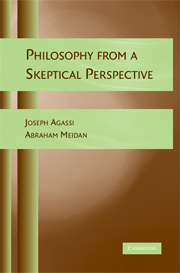7 - Conclusion
Published online by Cambridge University Press: 05 June 2012
Summary
Thus, our brief survey comes to its conclusion. This final chapter summarizes the main ideas of the previous chapters with an accent on practical implications and offers a few parting thoughts.
Throughout this work, we presented radical skepticism, according to which no statement (or judgment) is certain or plausible (in the epistemological sense of these terms). We claimed that, contrary to popular criticism, skepticism is common sense, implies no absurdities, and permits alternative tentative theories of reasonability to discuss it critically, much in accord with common sense.
Complete error avoidance is impossible. This is practically important because under the influence of empiricism, many people still try to avoid error at all cost and then they find themselves doing so by clinging as much as possible to known observation-reports. This may lead them to present as few ideas as they can, limiting themselves to irrefutable ideas. Such ideas do not reduce unexpectedness; as such, they are uninteresting. As skeptics, we claim that aiming at error avoidance at all cost is itself a serious error. (As a popular edict goes, those who close their door to risk also close it to opportunity.) Sadly, we have to repeat the obvious: we do not recommend the conscious advocacy of falsehoods.
- Type
- Chapter
- Information
- Philosophy from a Skeptical Perspective , pp. 145 - 150Publisher: Cambridge University PressPrint publication year: 2008



